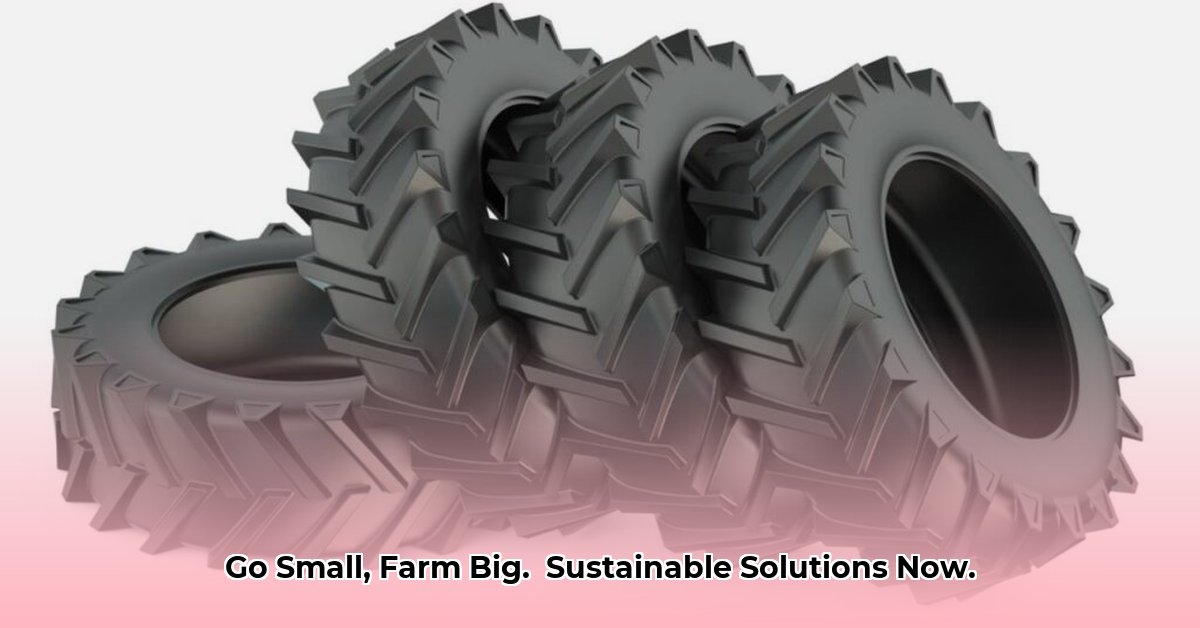
Small tractor tires, often overlooked, are crucial for sustainable farming practices. Their impact on soil health, fuel efficiency, and long-term farm economics is significant. Choosing the right tires is an investment in a healthier planet and a more profitable future. For more information on improving tire traction, check out this helpful resource.
Minimizing Soil Compaction: Protecting Your Farm's Foundation
Soil compaction, the compression of soil particles, is detrimental to crop yields and overall soil health. Compacted soil inhibits water infiltration, reduces aeration, and restricts root growth. This leads to decreased yields, increased reliance on chemical fertilizers, and long-term soil degradation. By selecting tires that minimize soil compaction, farmers can enhance soil health, improve water retention, and foster a more sustainable farming system.
Tire Technology and Environmental Impact: Innovations for a Greener Future
Modern tire technology is evolving to address environmental concerns. Several key advancements contribute to more sustainable tire options:
Improved Tread Designs: Innovative tread patterns are designed to minimize soil disturbance while maximizing traction. This ensures efficient field operation without compromising soil structure. Reduced compaction promotes healthy soil and mitigates environmental damage.
Sustainable Materials: Tire manufacturers are increasingly utilizing recycled rubber and bio-based materials in tire production. This reduces reliance on virgin materials, lowers the carbon footprint of tire manufacturing, and promotes a circular economy within the agricultural sector.
Advanced Air Pressure Management: Maintaining optimal tire pressure is crucial. Proper inflation reduces rolling resistance, minimizing fuel consumption and soil compaction. Accurate pressure monitoring systems contribute to fuel efficiency and environmental responsibility.
The Long-Term Economics of Sustainable Tires: A Sound Investment
While the initial cost of high-quality, sustainable tires might be higher, the long-term benefits outweigh the upfront expense. These tires typically boast extended lifespans, reducing replacement costs and minimizing downtime. Furthermore, enhanced fuel efficiency translates to significant operational savings over the tire's lifetime. This makes selecting sustainable tires a financially responsible and environmentally conscious decision. Have you considered the total cost of ownership when evaluating tire options?
Actionable Steps for Sustainable Tire Management: A Practical Guide
Implementing these steps will significantly contribute to sustainable tire management:
Regular Pressure Checks: Consistent tire pressure monitoring is vital. Under-inflation dramatically increases fuel consumption and intensifies soil compaction. Regular checks ensure optimal performance and minimize environmental impact.
Targeted Tire Selection: Choosing tires appropriate for your soil type and farming practices is paramount. Different soil conditions require different tire characteristics for optimal performance and minimal compaction. Consider your specific needs before making a selection.
Tire Rotation for Longevity: Rotating tires distributes wear evenly, extending their lifespan and maximizing their value. This reduces the frequency of replacement, minimizing waste and reducing environmental impact.
Responsible Tire Disposal: Proper disposal and recycling of old tires are crucial. This prevents environmental contamination and supports sustainable waste management practices within the agricultural sector.
The Future of Sustainable Tractor Tires: A Continuous Journey
Ongoing research and development continue to push the boundaries of sustainable tire technology. Future innovations promise even more eco-friendly materials, advanced tread designs, and potentially self-regulating air pressure systems. This continuous innovation ensures a more environmentally responsible future for agriculture. What technological advancements are you most excited to see in sustainable tractor tires?
How to Compare Sustainable Tractor Tire Performance Metrics: A Data-Driven Approach
Choosing sustainable tires necessitates a thorough understanding of performance metrics. This involves analyzing various factors and their long-term impact on both your farm's profitability and the environment.
Key Metrics for Informed Decision-Making
Several key performance metrics guide sustainable tire selection:
Rolling Resistance: Lower rolling resistance directly equates to fuel savings and reduced carbon emissions. This is a critical factor in sustainable agriculture, minimizing the environmental impact of farm operations.
Traction: Adequate traction is crucial for efficient field operations. However, the balance between traction and soil compaction must be considered; excessive traction can lead to increased soil damage.
Load Capacity: Tires must have sufficient load capacity to handle the weight of the tractor and implements. Overloading can lead to premature tire wear, increased fuel consumption, and excessive soil compaction.
Tire Durability: Longer-lasting tires reduce the frequency of replacement, minimizing waste and lowering operational costs. Durability is a key factor for both economic and environmental sustainability.
Soil Compaction: This is arguably the most crucial metric for sustainable farming. Minimizing soil compaction protects soil structure, improves water infiltration, and promotes overall soil health.
A Practical Approach to Tire Comparison
Comparing tire options requires a methodical approach:
Data Acquisition: Gather specifications from tire manufacturers and seek out independent testing data to support your decision.
Metric Analysis: Thoroughly compare rolling resistance, traction, load capacity, and durability across different tire options. Prioritize metrics based on your farm's specific requirements.
Soil Compaction Assessment: Evaluate the potential for soil compaction for each tire. Favor tires with demonstrably lower compaction potential.
Life Cycle Considerations: While challenging to quantify completely, consider the overall environmental impact of each tire throughout its lifecycle, from manufacturing to disposal.
Beyond the Numbers: Qualitative Factors
While quantitative data is crucial, qualitative factors also play a significant role. Trade-offs may exist between different metrics. For example, a tire might offer slightly lower fuel efficiency but significantly improved traction in specific soil conditions. A holistic evaluation considering all factors is necessary.
Dr. Emily Carter, Soil Science Professor, University of California, Davis, emphasizes, "Sustainable tire selection is not just about the immediate cost; it's about long-term soil health and environmental stewardship. Farmers must carefully weigh all factors to make informed decisions that benefit both their bottom line and the planet.”